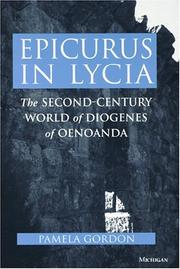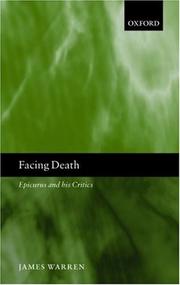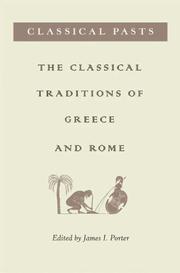| Listing 1 - 10 of 15 | << page >> |
Sort by
|
Book
ISBN: 3111029735 Year: 2023 Publisher: Berlin/Boston : Walter de Gruyter GmbH,
Abstract | Keywords | Export | Availability | Bookmark
 Loading...
Loading...Choose an application
- Reference Manager
- EndNote
- RefWorks (Direct export to RefWorks)
The collection of essays in this volume offers fresh insights into varied modalities of reception of Epicurean thought among Roman authors of the late Republican and Imperial eras. Its generic purview encompasses prose as well as poetic texts by both minor and major writers in the Latin literary canon, including the anonymous poems, Ciris and Aetna, and an elegy from the Tibullan corpus by the female poet, Sulpicia. Major figures include the Augustan poets, Vergil and Horace, and the late antique Christian theologian, Augustine. The method of analysis employed in the essays is uniformly interdisciplinary and reveals the depth of the engagement of each ancient author with major preoccupations of Epicurean thought, such as the balanced pursuit of erotic pleasure in the context of human flourishing and the role of the gods in relation to human existence. The ensemble of nuanced interpretations testifies to the immense vitality of the Epicurean philosophical tradition throughout Greco-Roman antiquity and thereby provides a welcome and substantial contribution to the burgeoning field of reception studies.
Antiquity. --- epicureanism. --- ethics. --- theology.
Book

ISBN: 9783110799330 3110799332 Year: 2024 Publisher: Berlin ; Boston : De Gruyter,
Abstract | Keywords | Export | Availability | Bookmark
 Loading...
Loading...Choose an application
- Reference Manager
- EndNote
- RefWorks (Direct export to RefWorks)
The body, touch and its sensations are present, sometimes viewed in contradictory ways, both expressed, visualized, and rejected, in early modern art and literature. In seven essays moving from the 16th to the mid-18th century, and from Italy and Spain to France and Sweden, this volume explores strategies used by early modern women poets, philosophers, and artists in order to create subversive expressions of the body, gender and the senses. Showing how body and soul, the carnal and the divine, the senses and the mind, could be represented as intertwined and dependent on each other in various ways, it gives due attention to European women writers and artists that in unconventional ways responded to the period's two main intellectual and philosophical attitudes - Epicurean and Stoic - towards the body and its senses. These attitudes not only intersect in the period's discussions of virtue and other moral phenomena, but are central to critical assessment of the relations between emotions, perception, and reason. By following this topic from a gender perspective, the book highlights other forms of subjectivity than the ones usually related to the early modern period's dominating subjectivation of female bodies, thinking and desires.
LITERARY CRITICISM / Subjects & Themes / Women . --- Women writers. --- epicureanism. --- stoicism. --- subjectivity.

ISBN: 0472104616 9780472104611 Year: 1996 Publisher: Ann Arbor University of Michigan Press
Abstract | Keywords | Export | Availability | Bookmark
 Loading...
Loading...Choose an application
- Reference Manager
- EndNote
- RefWorks (Direct export to RefWorks)
Epicurean philosphers --- Epicureanism --- Epicureans (Greek philosophy) --- Epicureeërs (Griekse filosofie) --- Epicuriens (Philosophie grecque) --- Epicurisme --- Epikureismus --- Philosophes épicuriens --- Philosophie épicurienne --- École épicurienne --- Épicurisme --- Épicurisme (Philosophie grecque) --- Épicuréisme --- Epicuriens --- Diogenes, --- Diogenes, of Oenoanda --- Diogenes, - of Oenoanda.
Book
ISSN: 09893849 ISBN: 2844670571 9782844670571 Year: 2003 Volume: *39 Publisher: Lille : Université Charles-de-Gaulle - Lille III,
Abstract | Keywords | Export | Availability | Bookmark
 Loading...
Loading...Choose an application
- Reference Manager
- EndNote
- RefWorks (Direct export to RefWorks)
Epicureans (Greek philosophy) --- Classical poetry --- Epicuriens --- Poésie ancienne --- History and criticism --- Histoire et critique --- Bollack, Mayotte --- Philodemus, --- Lucretius Carus, Titus --- Epicureanism --- Rome --- Poetry --- Poésie ancienne --- Philodemus, - ca. 110-ca. 40 B.C. --- Rome - Poetry
Book
ISBN: 2909422844 9782909422848 Year: 2004 Volume: *2 Publisher: Fougères (La Versanne) : Encre marine,
Abstract | Keywords | Export | Availability | Bookmark
 Loading...
Loading...Choose an application
- Reference Manager
- EndNote
- RefWorks (Direct export to RefWorks)
Epicurean philosphers --- Epicureanism --- Epicureans (Greek philosophy) --- Epicureeërs (Griekse filosofie) --- Epicuriens (Philosophie grecque) --- Epicurisme --- Epikureismus --- Genot --- Jouissance --- Lust (Gevoel) --- Lustgevoel --- Philosophes épicuriens --- Philosophie épicurienne --- Plaisir --- Pleasure --- Plezier --- École épicurienne --- Épicurisme --- Épicurisme (Philosophie grecque) --- Épicuréisme --- Valla, Lorenzo --- EPICURIENS --- PHILOSOPHIE GRECQUE --- HEDONISME --- VALLA (LORENZO), 1405-1457 --- PLAISIR (MORALE) --- DANS LA LITTERATURE --- OEUVRES --- 15E SIECLE --- EDITION CRITIQUE

ISBN: 0199252890 9780199252893 019929769X 9780199297696 0191601403 9786611989934 1281989932 0191531006 Year: 2004 Publisher: Oxford Clarendon
Abstract | Keywords | Export | Availability | Bookmark
 Loading...
Loading...Choose an application
- Reference Manager
- EndNote
- RefWorks (Direct export to RefWorks)
(Publisher-supplied data) The ancient philosophical school of Epicureanism tried to argue that death is "nothing to us." Were they right? James Warren provides a comprehensive study and articulation of the interlocking arguments against the fear of death found not only in the writings of Epicurus himself, but also in Lucretius' poem De rerum natura and in Philodemus' work De morte. These arguments are central to the Epicurean project of providing ataraxia (freedom from anxiety) and therefore central to an understanding of Epicureanism as a whole. They also offer significant resources for modern discussions of the value of death--one which stands at the intersection of metaphysics and ethics.
Death. --- Epicureans (Greek philosophy) --- Epicurus. --- Epicurean philosphers --- Epicureanism --- Epicureeërs (Griekse filosofie) --- Epicuriens (Philosophie grecque) --- Epicurisme --- Epikureismus --- Philosophes épicuriens --- Philosophie épicurienne --- École épicurienne --- Épicurisme --- Épicurisme (Philosophie grecque) --- Épicuréisme --- Mort --- Epicuriens --- Death --- Philosophy, Ancient --- Dying --- End of life --- Life --- Terminal care --- Terminally ill --- Thanatology --- Philosophy --- Epicurus --- Ἐπίκουρος --- Epikouros --- Epikuros --- Ėpikur --- Epiḳoros --- Epicuro --- Abīqūr --- Yibijiulu --- Epicure --- Epʻikʻurosŭ --- Attitude to Death. --- Philosophy. --- Epicureans (Greek philosophy). --- Doodsangst. --- Epicurisme. --- Klassieke oudheid. --- Mort. --- Épicuriens. --- Tod. --- Philosophie. --- Epikureer. --- Epicurismo. --- Filosofia grega. --- Épicure. --- Epicuro.
Book
ISBN: 3110674688 3110674661 311065962X Year: 2020 Publisher: De Gruyter
Abstract | Keywords | Export | Availability | Bookmark
 Loading...
Loading...Choose an application
- Reference Manager
- EndNote
- RefWorks (Direct export to RefWorks)
La fine del mondo costituisce uno dei temi centrali del De rerum natura, testo che rappresenta inoltre la nostra principale fonte sull'escatologia cosmica epicurea. Mosso dall'intento d'indagare questo aspetto cruciale (che non è mai stato in precedenza oggetto di studi monografici), questo libro propone un commento delle principali sezioni escatologiche del poema: i finali del primo e del secondo libro, i vv. 91-415 del quinto e la rassegna dei fenomeni meteorologici più violenti nel sesto. L'analisi delle fonti filosofiche e degli obbiettivi polemici permette di dare risposte alla questione del "fondamentalismo" di Lucrezio, ponendo inoltre le basi per un esame del suo peculiare "sublime apocalittico". Le appendici forniscono ulteriori considerazioni sull'immaginario escatologico lucreziano, concentrandosi sul modello offerto da Empedocle, le strategie comunicative del poeta e la possibile influenza del trattato pseudo-aristotelico De mundo. Questo esame mostra che il poeta richiama dottrine e fonti filosofiche successive a Epicuro, senza però cadere nell'eclettismo: uomo del suo tempo, Lucrezio "attualizza" le dottrine del maestro, proponendole come risposta per le angosce della propria epoca.
Literary studies: classical, early & medieval --- Western philosophy: Ancient, to c 500 --- Epicureanism. --- Eschatology. --- Lucretius. --- Sublime. --- Lucretius Carus, Titus. --- De rerum natura (Lucretius Carus, Titus) --- T. Lucreti Cari De rerum natura libri sex (Lucretius Carus, Titus) --- Titi Lucretii Cari poetae ac philosophi vetustiss. De rerum natura libri sex (Lucretius Carus, Titus) --- Titi Lucretij Cari poetae ac philosophi uetustiss. De rerum natura libri sex (Lucretius Carus, Titus) --- Titi Lucretii Cari De rerum natura libri sex (Lucretius Carus, Titus)

ISBN: 0691089418 0691089426 0691225397 Year: 2006 Publisher: Princeton University Press
Abstract | Keywords | Export | Availability | Bookmark
 Loading...
Loading...Choose an application
- Reference Manager
- EndNote
- RefWorks (Direct export to RefWorks)
The term "classical" is used to describe everything from the poems of Homer to entire periods of Greek and Roman antiquity. But just how did the concept evolve? This collection of essays by leading classics scholars from the United States and Europe challenges the limits of the current understanding of the term. The book seeks not to arrive at a final definition, but rather to provide a cultural history of the concept by exploring how the meanings of "classical" have been created, recreated, and rejected over time. The book asks questions that have been nearly absent from the scholarly literature. Does "classical" refer to a specific period of history or to the artistic products of that time? How has its definition changed? Did those who lived in classical times have some understanding of what the term "classical" has meant? How coherent, consistent, or even justified is the term? The book's introduction provides a generous theoretical and historical overview. It is followed by eleven chapters in which the contributors argue for the existence not of a single classical past, but of multiple, competing classical pasts. The essays address a broad range of topics--Homer and early Greek poetry and music, Isocrate, Hellenistic and Roman art, Cicero and Greek philosophy, the history of Latin literature, imperial Greek literature, and more. The most up-to-date and challenging treatment of the topic available, this collection will be of lasting interest to students and scholars of ancient and modern literature, art, and cultural history.
Beschaving [Grieks-Romeinse ] --- Civilisation gréco-romaine --- Civilization [Greco-Roman ] --- Cultuur [Grieks-Romeinse ] --- Greco-Roman civilization --- Grieks-Romeinse beschaving --- Grieks-Romeinse cultuur --- Civilization, Greco-Roman. --- Civilization, Greco-Roman --- Civilization, Classical --- klasszika-filológia --- klasszikus irodalom --- művészettörténet --- tanulmányok --- Academy. --- Achaemenids. --- Acusilaus of Argos. --- Alcamenes. --- Antinoopolis. --- Athenocentrism. --- Bacchylides. --- Boeotia. --- Bronze Age. --- Caecilius. --- Callimachus. --- Cato. --- Corinthian classicism. --- Dionysius. --- Domitian. --- Empedocles. --- Ennius. --- Epicureanism. --- Gorgias. --- Hadrian. --- Hellenism. --- Hera Teleia. --- Horace. --- Italic art. --- Jesus. --- Jupiter Dolichenus. --- Justinian. --- Laevius. --- Latin. --- Livius Andronicus. --- Lucian. --- Lycurgus. --- Lysias. --- Maecenas. --- Martial. --- Oppian. --- Osiris. --- classicus. --- cultural memory. --- democracy. --- emotion. --- euphonism. --- historical distance. --- historical narrative. --- humanism. --- ideology. --- imperialism. --- modernity. --- monuments. --- mythography. --- naturalism. --- neoteric literature. --- orality. --- oratory.
Book
ISBN: 1400880475 Year: 2016 Publisher: Princeton, NJ : Princeton University Press,
Abstract | Keywords | Export | Availability | Bookmark
 Loading...
Loading...Choose an application
- Reference Manager
- EndNote
- RefWorks (Direct export to RefWorks)
In the Sermon on the Mount, Jesus tells his followers to let go of earthly concerns by considering the lilies of the field and the birds of the air. Søren Kierkegaard's short masterpiece on this famous gospel passage draws out its vital lessons for readers in a rapidly modernizing and secularizing world. Trenchant, brilliant, and written in stunningly lucid prose, The Lily of the Field and the Bird of the Air (1849) is one of Kierkegaard's most important books. Presented here in a fresh new translation with an informative introduction, this profound yet accessible work serves as an ideal entrée to an essential modern thinker.The Lily of the Field and the Bird of the Air reveals a less familiar but deeply appealing side of the father of existentialism-unshorn of his complexity and subtlety, yet supremely approachable. As Kierkegaard later wrote of the book, "Without fighting with anybody and without speaking about myself, I said much of what needs to be said, but movingly, mildly, upliftingly."This masterful edition introduces one of Kierkegaard's most engaging and inspiring works to a new generation of readers.
Philosophy, Danish. --- Christian life --- Lutheran authors. --- Absolute (philosophy). --- Allusion. --- Americans. --- Bianco Luno. --- Brief Lives. --- Buoyancy. --- Career. --- Christendom. --- Christianity. --- Clothing. --- Consider the Lilies. --- Credulity. --- Danish Golden Age. --- Discourses (Meher Baba). --- Epicureanism. --- Figure of speech. --- German idealism. --- God the Father. --- God. --- Greek Philosophy. --- Henry David Thoreau. --- Imagery. --- Kingship and kingdom of God. --- Lection. --- Lightness (philosophy). --- Lightness. --- Literature. --- Luck. --- Meekness. --- Meteorology. --- Mourning dove. --- Nature. --- Obedience (human behavior). --- Omnipotence. --- Oven. --- Paganism. --- Philosopher. --- Piety. --- Pity. --- Popular sovereignty. --- Practice in Christianity. --- Printing. --- Publication. --- Requirement. --- Righteousness. --- Romanticism. --- S. (Dorst novel). --- Selfishness. --- Søren Kierkegaard. --- Telegraphy. --- The Point of View of My Work as an Author. --- The Sickness Unto Death. --- The gospel. --- Theodorus the Atheist. --- Theology. --- Thought. --- Transcendentalism. --- Understanding. --- Veneration. --- Writing.
Book
ISBN: 2745310003 9782745310002 Year: 2004 Volume: 59 Publisher: Paris Honoré Champion
Abstract | Keywords | Export | Availability | Bookmark
 Loading...
Loading...Choose an application
- Reference Manager
- EndNote
- RefWorks (Direct export to RefWorks)
Epicureans (Greek philosophy)
---
Didactic poetry, Latin.
---
Philosophy, Ancient.
---
Epicuriens
---
Poésie didactique latine
---
Philosophie ancienne
---
Lucretius Carus, Titus.
---
Epicurus.
---
De rerum natura (Lucretius)
---
Epicurisme.
---
Influence.
---
Littérature didactique.
---
Poésie.
---
Poétique.
---
Receptie.
---
Renaissance.
---
Épicurisme.
---
Poésie didactique latine.
---
Philosophie ancienne.
---
Rezeption.
---
Geistesgeschichte 1400-1600.
---
Epikureismus.
---
Italian literary studies
---
Philosophical influence
---
Epicureanism
---
Italian renaissance
---
Lucrèce
| Listing 1 - 10 of 15 | << page >> |
Sort by
|

 Search
Search Feedback
Feedback About UniCat
About UniCat  Help
Help News
News